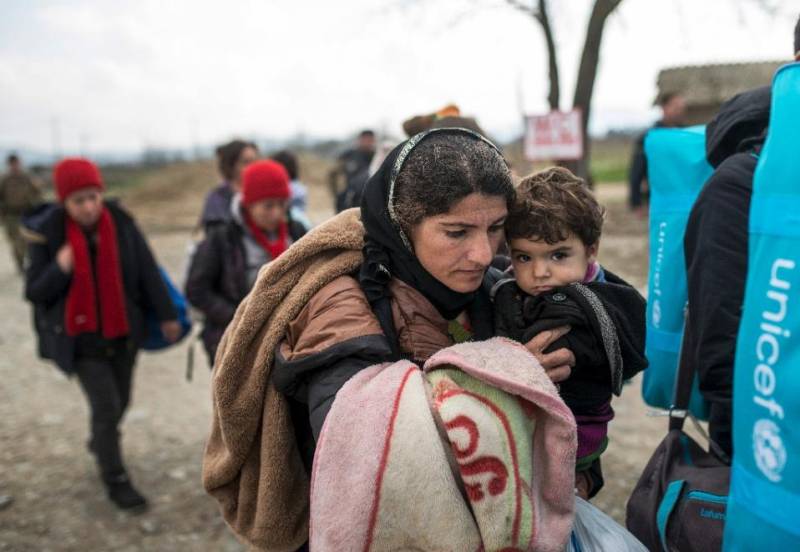Ljubljana: Four Balkan countries on Friday announced a daily cap on migrant arrivals, deepening the crisis gripping the European Union, as Brussels warned of "disaster" if an upcoming summit with Turkey failed.
Slovenia and Croatia, which are European Union members, as well as Serbia and Macedonia, said they would each restrict the number of migrants allowed to enter their territory to 580 per day.
The clampdown follows moves by Austria last week to introduce a daily cap of 80 asylum applications and let only 3,200 migrants transit the country each day.
UN Secretary General Ban Ki-moon on Friday voiced concern over the rising wave of border restrictions in the Balkans, saying they ran contrary to the international refugee convention.
He called on "all countries to keep their borders open, and to act in a spirit of responsibility sharing and solidarity, including through expanding legal pathways to access asylum," according to UN spokesman Stephane Dujarric.
The caps on migrant arrivals have fuelled a bitter diplomatic row between Athens and Vienna and hand-wringing in Brussels.
View gallery
Map showing areas of tension in Europe due to restrictions on the flow of migrants and refugees in E …
Greece accuses Austria of unleashing a domino effect of border restrictions along the migrant trail that has led to a bottleneck on Greek soil.
Austria, in return, accuses Greece of failing to properly police the bloc's external borders and letting too many migrants continue their journey to northern Europe.
The tighter controls have left thousands of people -- including many children -- stranded in Greece, as Europe's worst migration crisis since World War II shows no sign of abating.
Close to 120,000 migrants have already arrived in Europe so far this year, according to the latest figures from the UN refugee agency.
They add to the one million who made the perilous journey in 2015, mostly across the Aegean Sea from Turkey to the Greek islands.
View gallery
Migrants and refugees from Syria and Iraq cross the Greek-Macedonian border near the town of Gevgeli …
- Escalating crisis -
The influx has boosted populist parties across Europe, bitterly divided the EU's 28 member states and thrown the future of the cherished passport-free Schengen zone into doubt.
The EU told Austria last week that limiting asylum claims was "plainly incompatible" with European laws and a European Commission legal opinion seen by AFP said it was illegal for countries to let asylum seekers transit through their territory.
Slovenia said the new daily limit on migrant numbers was in line with a deal reached on February 18 between police chiefs of Austria, Croatia, Serbia and Macedonia.
But Austria on Friday said no specific figure had been agreed upon at the meeting and declared each country determined its own border policy.
View gallery
A refugee prays at the port of Piraeus, in Greece where hundreds of refugees are staying temporarily …
The EU on Friday pushed for a deal with Turkey -- the key gateway for migrants arriving in Europe from the Middle East -- to be discussed at a special summit in early March.
Under the proposal, agreed last November but yet to be implemented, Turkey would seal its borders to curb the flow and then fly refugees to Europe for resettlement, in exchange for three billion euros ($3.3 billion).
"If there is no convergence and agreement (with Turkey) on March 7, we will be led to disaster," EU migration commissioner Dimitris Avramopoulos warned on Friday.
EU president Donald Tusk will visit the Balkan states next week seeking to heal deep divisions over how to tame the migrant crisis, his office said Friday.
- Thousands stranded -
Thousands of refugees have been left stranded in Greece after neighbouring Macedonia denied all passage to Afghans and ramped up document controls for Syrians and Iraqis.
On Friday, there were some 4,000 people waiting to cross at the border post of Idomeni, local police said.
Greek authorities have been regulating the flow of refugees but hundreds have set out on foot for the border, determined to continue their journey despite being told they will be turned back.
The government said efforts were under way to house migrants on the islands where they land by boat from neighbouring Turkey until the border situation is resolved.
"We are trying to slow the flow (to the border) until a solution is reached," a migration ministry source told AFP.
Albania has warned that a growing number of migrants are seeking to transit its country as other routes on the trail are closed or restricted.
Separately on Friday, Germany said it was unable to locate some 130,000 people, or nearly one in seven, of those who had requested asylum last year.
They may have returned to their home countries, travelled on to another nation, or gone underground, Berlin said, adding that some people may have been registered multiple times.






